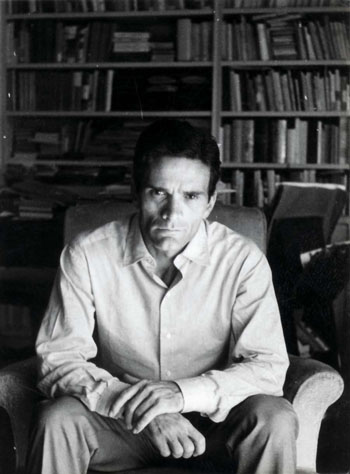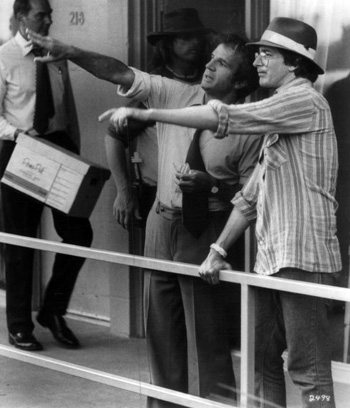“It still boggles the mind that perhaps the most important single figure in the socio-religiously conservative Italy’s artistic media of the 1960s through the mid-’70s—an extraordinarily fertile period, particularly for cinema—was an openly queer Marxist atheist and relentless church critic,” marvels Dennis Harvey in the San Francisco Bay Guardian. “Pasolini‘s film work has a lingering rep as being somewhat rough sledding, in both themes and technique. Certainly he was no extravagant cinematic stylist on the level of Antonioni, Visconti, Fellini, and Bertolucci (though he contributed as a writer to films by the latter two), the other leading Italian auteurs of the time. But it’s surprising how pleasurable on many levels his features look today, as showcased in a traveling retrospective getting its Bay Area exposure at the Castro Theatre, Roxie Theater, and Berkeley’s Pacific Film Archive through Oct. 31.”
Earlier this week, Sara Maria Vizcarrondo walked us through the Pasolini oeuvre here in Keyframe, and the SF Weekly‘s Jonathan Kiefer presents a quick guide to this weekend’s screenings. Michael Guillén, in the meantime, has been diving deep, collecting past critical takes on each of the films, posting a major roundup of Jonathan Rosenbaum‘s writings on Pasolini as well as Raymond Durgnat‘s 1967 essay on The Gospel According to Saint Matthew (1965), and then meticulously indexing a wealth of resources archived by the PFA’s Cine-Files project. Major stuff.
New York. As the Museum of the Moving Image’s Complete Howard Hawks retrospective runs on through November 10, Moving Image Source has reposted a conversation with Molly Haskell and the late Andrew Sarris which took place in 2008 and focused on the auteurists’ reappraisal—resurrection, really—of Hawks’s work in the ’60s. And Will McKinley has extensive notes on Dan Sallitt‘s introduction to the Museum’s screening of To Have and Have Not (1944), beginning with the observation that the presence of Michael Curtiz’s Casablanca (1942) is felt throughout: “Something made in the shadow of something else, can, in fact, be the superior work of art. I would certainly say that’s the case here.”
Yesterday, I posted a few notes on Miriam Bale‘s La Di Da Film Festival, on now and running through Monday. Since then, the New Yorker‘s Richard Brody has written up a few recommendations for those on the lookout for “some striking and original independent films (primarily but not solely American).”
Tonight at Light Industry, C. Ondine Chavoya will be lecturing on “the origins and influence of the No Movie, an intermedia genre pioneered by the LA-based artist collective Asco in the early 1970s.”
Reading. Entertainment lawyer Frank Gruber for the Los Angeles Review of Books on B. James Gladstone’s The Man Who Seduced Hollywood: The Life and Loves of Greg Bautzer, Tinseltown’s Most Powerful Lawyer: “It’s a great story and the book is a good read, yet the last three words of the title raise a question: was Bautzer Hollywood’s most powerful lawyer? And, for that matter, what did it mean—what does it mean—to be a powerful lawyer in Hollywood?”
And finally for now, Dan North‘s posted a letter Jean Renoir wrote to François Truffaut regarding the latter’s performance in Close Encounters of the Third Kind (1977). Why? Because North is contributing “a chapter to a forthcoming anthology of extended essays on the work of Steven Spielberg, to be published in 2015…. And because I like setting myself ridiculous tasks when I have plenty of other work I should be getting on with, and because I want to give this blog a boost, I’m pledging to write 100 short posts about Steven Spielberg.” This’ll be fun.
For news and tips throughout the day every day, follow @KeyframeDaily on Twitter and/or the RSS feed. Get Keyframe Daily in your inbox by signing in at fandor.com/daily.






